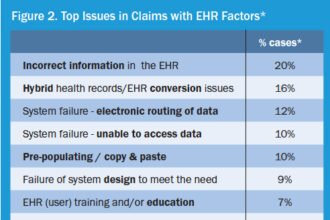You would never criticize a Volkswagen dealer because the car you purchased from them was not a Mercedes. Yet too many physicians outsource their billing and then complain about the performance of the company they choose because what they expected was not what they purchased, the company doing what they do, and the physician expecting much more. Did the physician buy based on price alone? Did they delegate the decision to staff, that did not understand what needed to be done, or perhaps saw the outsourcing as a job threat?
Physicians need to fully understand their billing process, if not the details, then the components so that they can clearly understand what services they are outsourcing, what are remaining, and even with outsourcing, what responsibilities remain in the practice, to make sure that billing is successfully being performed. Outsourcing billing cannot be, sign and drive – sign and forget. Regardless of the degree of outsourcing that is being contracted, billing has to remain an interactive activity of the practice.
What is referred to is a broad range of individual parts, and what parts are provided, versus retained is important to have clear with your billing company.
Billing –What Billing?
Is it all billing, commercial, Medicare, and Medicaid? What about worker comp, no-fault, self-pay? And while you’re at it, who is responsible for billing balances for secondary insurances, as well as for patient responsibilities not collected at the time of service?
Patient Billing Should Be Your Last Resort
Rejections and Requests for More Information
Resubmissions can’t occur correcting the problem that caused the claim to be rejected. Or without perhaps medical record information being submitted. This is where billing remains interactive with an office, and who in your shop is going to be responsible to obtain this information timely and getting it to the billing company. Or in the case of submitting medical record information, who is responsible for that function? This area is often the single greatest source of dissatisfaction with billing companies, as the process of dealing with cleaning up rejections/requests for more information fall by the wayside within the office, and there is no device to send up red flags that without this information your claims are being delayed, and even possibly rejected for timely filing. You need a process, a reporting function, and an alert system is something is going wrong.
Follow up
If a bill is not paid in 35 days, who is responsible for follow up, to verify that the claim has been received by the pay source, and if not re-submit, and if received, filing a prompt-pay complaint with the state’s regulatory agency? Many states require payment of electronic claims within 30 days of date received, (longer if submitted on paper) so there is no reason not to have your claim paid, money in your bank by day 35. If not, there is an issue to be checked out. Who is responsible for this function? For sending the complaints, for verifying and documenting the receipt of claims?
If Billed and Paid, What Happens Next
Ideally the money should flow into your account, any fees and financial obligations to a billing company should be identified and paid separately. You may want to allow your fees to be deducted from your account, but you want the payments to go to your account. (Billing companies that deposit in their accounts, deduct fees and then remit to you means that your funds are a ready source of cash flow if the billing company needs a little assist)
Billed & Denied
Who is responsible for researching the reason for the denial, making the decision that the claim should be appealed, and actually submitting and tracking the appeal? Appeals must be timely and can take a special effort to understand the reasons for the denial and preparing a successful appeal.
Posting
Who posts payments? Your receivables are only as accurate as keeping your accounts timely posted.
Balances and Collections
Who has authority to write off balances? The only one that should be able to write off any balance on any account should be the physician or their employee, and even so, it should only be done following a review of the accounts. Give a billing company such control and you will not know if their write-offs are covering up poor performance on their part. Each account balance should be reviewed before writing off. Contractual allowances should account the vast majority of write-offs. Then you need to have a plan for the balances, which are likely patient responsibilities. If you have a contingent credit card program, easy to bill the cards the patient balance. If not, who is responsible for billing those patient balances, and then what is your process for collections if not paid? What is your time frame for allowing payment before turning the accounts over to collections? Is your billing company your collection agent as well? (If so are you sure they are following the regulations of the federal Fair Debt Collections Practices Act? If not, the liability could be yours.)
Billed, paid, and posted then:
Auditing payment amounts
Just because you have been paid does not mean you have been paid correctly. Who is going to track your payments and compare them with what you are contractually allowed? This can result in the need for an appeal. Depending on the study used as a reference, between 6% and up to 20% of all claims are bine paid at something other than the allowable amount.
Reporting
what is the process for routine reporting on the performance of your billing operation? Who prepares the report? What does it include? A number of bills, dollars billed, dollars collected, all by payment categories. Importantly, such reports need to include denials, and the causes, so that you can learn from those losses.
Who Will be Talking with Whom
Are you delegating to the billing company your patient communications about billing? If so, what is the process to make sure they represent you as you want to be represented? Billing companies are not known for patient friendliness. What is the communication you want between the billing company and your patients? If there is communication, how do you want it documented to you, so you can learn from the complaints/comments?
What Else do You Expect from the Billing Company
And to they do it? How much do you expect the billing company to become your “consultant” on non-billing matters? Credentialing with payers? Representing you in contract negotiations? Are they responsible to suggest changes to your coding for coding updates and perhaps additional billable services? (If you billing company gets a percentage of billed, confirm the legitimacy of the suggestions when they propose to add a code to increase the payment amounts.)
Using an outsourced billing company delegates the tool that brings in the dollars. It’s a tool if it is the right tool, a billing company with the expertise, and it is used correctly by your practice.








